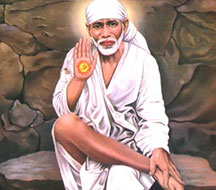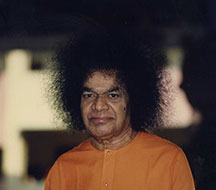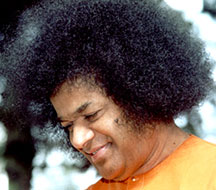_1439794035.jpg)
Man creates his own problems: Analogy from Mahabharatha
Puttaparthi, Sai Kulwanth Hall (1996 Special Discourses )
Description
Others do not give either pleasure or pain. Man’s thoughts, words and deeds are solely responsible for the pleasure or pain that he experiences. Devudanaga veru desamanduna ledu, Devudanaga kaladu dehamande, Papamanaga veru paradesamuna ledu, Taanu cheyu panula tagili yundu!! God is not present in a foreign land, He is present in one’s body!! Sin is not present in any foreign country, It is attached to one’s deeds!! But without realising this truth, blames others for his pain and pleasure and thinks that he is subjected to pain and pleasure due to others actions. At times man is subjected to many troubles due to the bad actions resulting from bad thoughts. During the Mahabharata war, Arjuna pressurised Krishna in many ways. He prayed to Krishna, “O Krishna! You as our emissary and ambassador go there and find out whether they are for peace or for war.” The youngest of Pandavas, Sahadeva, was an ardent devotee of Krishna. Dharmaja, Bhima and Arjuna agreed to send Krishna as an emissary. But Sahadeva did not agree to it because of his intense love and attachment to Krishna. He was reluctant to send him to the wicked Kauravas and was worried about His safety. He did not drink water till Krishna returned from Hasthinapura and spent his time in continuous remembrance of Krishna. Krishna returned from Hasthinapura and said, “Arjuna, be ready for the war, do not retreat now. They are fixed on war.” Sahadeva went to Krishna and held His hands tightly and said, “I felt that sending my beloved brother-in-law to Hasthinapura was not proper. I could not muster courage to voice my disapproval. But I prayed inwardly for the safety of my brother-in-law. I prayed that everything auspicious should happen to Krishna. Krishna has returned safe and secure. That in itself is enough for me.” The thoughts and behaviour of ardent devotees are very sacred. How were the thoughts of Arjuna? Arjuna too had love and affection towards Krishna but he loved to fight. Krishna offered to go again to Hasthinapura for the second time. Arjuna could not bear this. He said, Kuracha buddhula aakauravulamarathakaligi mana potthukothura? Yudhdhamu sidhdhamanaka kaala haranamika yela? “Krishna, the mean minded fellows that the Kauravas are, will they want peace? Let’s be ready to fight. Why waste time? Krishna, tell them to be ready for the battle. Why try to put fragrant jasmines in fire? Why talk to foolish people? Will they listen to the words of wisdom? O Gopala, why this talk of peace? Let’s stop these talks. Will the North and South poles ever meet? Be ready to fight, why waste time? Will the north ever meet the south? East and west come in between them. Hence, these two will never meet. Get ready for war tomorrow.” So saying Arjuna blew his conch. Krishna was the charioteer of Arjuna. He stopped the chariot in between the two army troops. The heart of Arjuna, who spoke so valiantly and courageously, melted at the sight of the friends and relatives on the other side. Indari bandhu, mitru guruputralu champi bharinchutetulo?? Krishna!! Naa kannulu tiruguchunnavi ika kaalamu gadapaka kadalu intikin!! How to bear the pain of killing so many friends, teachers and relatives? My head is reeling, let’s go home without delay. Did Arjuna not know that the people in opposite side were his relatives and friends prior to the war?!! But the young blood and chivalry in Arjuna made him speak so. It is the heart of the young and trend of the hot blood. Youth is like the passing cloud. The stage of youth comes in between and passes off. Why pride on the youth that comes in the middle and goes away? At the time of the war Krishna was seventy six years old. And Arjuna was seventy four. In those days seventy four year old were considered to be in the prime of their youth!! Eighteen years old are considered to be youth in the present day!! In Tretha yuga this age of eighteen was considered to be childhood. Till fifty years of age they were considered to be in childhood. The stage of youth started at the age of seventy five!! The commander-in-chief, Bhishma, was hundred and twelve years old!! The hundred and twelve year old person was the commander–in-chief!! What is the reason? The food and eating habits were the reason for their strength. Man ages early due to the modern food habits.
Topics
-Mahabharata
-

All Indians must be united: Analogy of Dharmaja
00:02:00Divine and novel thoughts are within man. For this, unity is very essential. Dharmaja set a very good ideal in this aspect. How did he do it? “We are one hundred and five brothers. We are not just five but a hundred and five brothers. During times of difference of opinion amongst us, we are five Pandavas and hundred Kauravas. But when threatened from outside we all unite to form a hundred and one brothers.” Similarly, all Bharathiyas should be one. The culture of Bharath is one, its Dharma is one, and Bharath race is one. Forgetting such oneness and giving room to differences the whole country is divided and has lost its sanctity. Party might be different, race might be different, state might be different, but all Bharathiyas are one. With such conviction the Bharathiyas should stand united and protect the nation. There may be many individual differences. On individual level, each one is for himself. But with respect to country all must unite and stand as one. This is the principle of Dharmaja. When there are differences amongst themselves the five Pandavas are apart from the hundred Kauravas. But when the country is threatened all unite as one. This unity, which is the main principle of Dharmaja, must be fostered.
-

Bavanu Hasthinapuramu: Poem by Sahadeva to Krishna
00:00:42Sahadeva went to Krishna and held His hands tightly and said, “I felt that sending my beloved brother-in-law to Hasthinapura was not proper. I could not muster courage to voice my disapproval. But I prayed inwardly for the safety of my brother-in-law. I prayed that everything auspicious should happen to Krishna. Krishna has returned safe and secure. That in itself is enough for me.”
-

Develop Selflessness like Krishna
00:02:00Develop only good ideas. What ever you do, do it selflessly. This is what Krishna did. He conquered a lot of kingdoms, He entered into political life. He freed people from all types of cuningness. He put down people who were on the wrong path. He gave power and authority to all people who would be able to manage. However many kings He defeated, He remained a king without a crown. After killing Kamsa, the people of the city prayed to him, 'Swami, you can become the king of this Madhurapuri and rule'. He said, 'If I become the king I may have only this kingdom, I would rather be a king-maker than a king. I should be the one who makes kings. I do not want this kingdom. I would rule the kingdom of your hearts. That is enough'. Such are the great and broad feelings of God. We are basing our understanding of Krishna on the basis of the cinemas and the dramas that we see.
Topics
- Analogies
- Atma
- Attachment
- Balvikas
- Bhaja Govindam
- Bhajans
- Body
- Character
- Company
- Compassion
- Culture
- Day to day
- Desire
- Devotees
- Devotion
- Dharma
- Discipline
- Discrimination
- Doctors
- Education
- Faith
- Festivals
- Forbearance
- Gayathri
- God
- Gratitude
- Guru
- Health and healthcare
- HIS Life
- Human values
- India
- Karma
- Love
- Man
- Meditation
- Mind
- Music
- Musicians
- Namasmarana
- Nature
- Parents
- Philosophical concepts
- Pleasure and Pain
- Practice
- Ramayana
- Religion
- Sacrifice
- Sadhana
- Sai Organization
- Saints
- Sathya
- Science
- Senses
- Service
- Sevadal
- Shanthi
- Shirdi Baba
- Society
- Spirituality
- Students
- Thoughts
- Time
- Unity
- Upanishad
- Vedas
- Vices
- Yoga
- Youth
